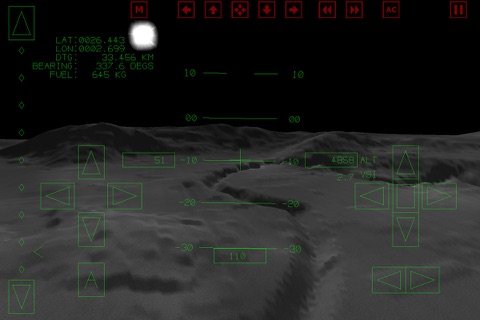
Lunar Search and Rescue app for iPhone and iPad
Developer: William Mitchell
First release : 25 Jul 2013
App size: 83.89 Mb
Warning! This game is hard! Nothing about this simulation has been simplified for the sake of an arcade-game experience. Real spacecraft dynamics dont give you five lives or a second chance when the fuel runs out. Real lunar terrain doesnt make exceptions when you cant kill your descent rate in time. All you have is a tank of fuel, the laws of physics, and the kind of jaw-dropping scenery that so far only the Apollo astronauts have seen with their own eyes. But if youre up for the challenge, then strap in for your new-found career among the elite ranks of Squadron LSAR-1: Lunar Search and Rescue.
The year is 2039. On the newly colonised Moon, lander pilots are vital to the growing lunar community. All transport, search & rescue and recovery tasks fall to them. To be a qualified lander pilot needs skill, practice and dedication, but the reward is the opportunity to fly a highly sophisticated aerospace vehicle in a hostile and unforgiving environment. With 6 missions of increasing difficulty, this is a flight simulator with a difference.
- The entire surface of the Moon is mapped and rendered. With enough fuel, theres nowhere you cant go - even into orbit! With authentic craters, mountains and valley systems (derived from NASA data from the Lunar Reconnaissance Orbiter, and a USGS-provided database of lunar geological features) the missions take place among real lunar landmarks such as Tycho Crater, Hadley Rille, and the Apennine Mountains.
- The real physics of the landers movement and dynamics are represented, using the same high fidelity techniques used in real aerospace flight simulators. This includes: varying mass and rotational inertia as fuel is used up, the thrust of the main engines and reaction control rockets, plus all velocities, forces and accelerations acting on the vehicle, just as they would in an airless lunar gravity environment.
- An autopilot function is included for covering long distances via a sub-orbital lob, precisely calculated and executed in a way no human pilot could achieve. (Once you get to the mission site however, youre on your own again!) Time acceleration mode gets you there even quicker.
- The control layout is based on the Apollo Lunar Excursion Module: Rotational controls on the right, Translational controls on the left, a sliding throttle, and basic instrumentation up front. There is even a navigation interface modelled on the Apollo Guidance Computer.
- Comprehensive help screens show all controls and instrumentation within the HUD (Head-Up-Display), including a training flight with on-screen prompts to help you fly the lander. The first mission even begins with the lander in flight, allowing you to get the feel of the craft right from the start.
- A demo mode is provided for that first low-fuel landing challenge as well, to show you how it is done.
- A ground school element is also included, describing the physics of space flight, including how mass, weight & inertia, in combination with forces, accelerations & velocities, really interact in order to determine how spacecraft can be flown and controlled. (Warning - this part does not hold back on mathematical detail, and includes full equations and numerical examples, so is an optional (but useful) part of the game!)
- It takes a while to learn to fly this thing, but once youre proficient youll have a lot of fun zooming over the lunar landscape at low level, flying down valley systems or through mountain ranges. An "Exploratory Flight" mission is even included, with no stated objective other than to go where you want to go, with the entire surface of the Moon open for sightseeing. Fly to other bases, lunar landmarks, or go to the old Apollo landing sites, and see the hardware they left behind - its all still there! Most important of all though, have fun!
- Data sources:
NASA: Terrain data, LRO/LOLA, http://lunar.gsfc.nasa.gov/lola. USGS: Lunar albedo and surface feature data, http://www.usgs.gov



